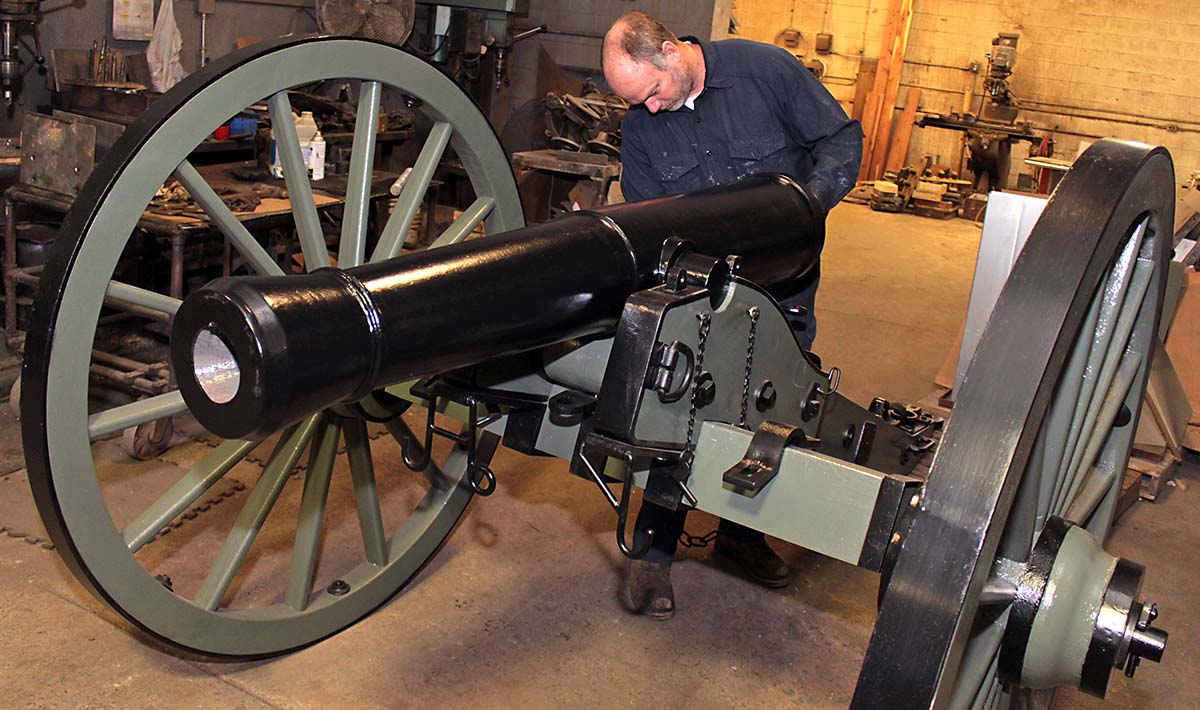 Clarksville, TN – Clarksville Foundry is one of the oldest continuously operating foundries in the United States. The foundry’s origins predate the Civil War, having first opened in 1847.
Clarksville, TN – Clarksville Foundry is one of the oldest continuously operating foundries in the United States. The foundry’s origins predate the Civil War, having first opened in 1847.
While the family owned and operated foundry today casts component parts for a variety of industries, it once manufactured cannons and munitions for the Confederate States of America (1861-1862).
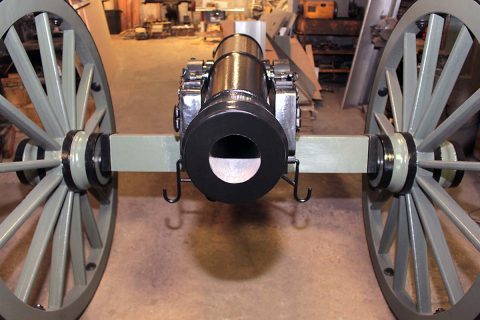
Prior to the Civil War Sesquicentennial in 2011, Clarksville Foundry President Charles Foust Jr. obtained an original drawing of a Model 1841 6-Pounder Field Gun, and along with foundry employees, created a pattern and cast a replica cannon barrel that was mounted on a borrowed Civil War-era carriage reproduction.
This 6-Pounder Field Gun was fired to kick off local Sesquicentennial festivities and is now on display at Fort Defiance Civil War Park and Interpretative Center overlooking the Cumberland River.
While assembling the newly-produced barrel onto the replica carriage, foundry personnel noticed that the carriage was almost entirely made of iron castings and agreed they should be able to cast their own version. They obtained copies of a complete set of engineering drawings for a No. 1 field gun carriage.
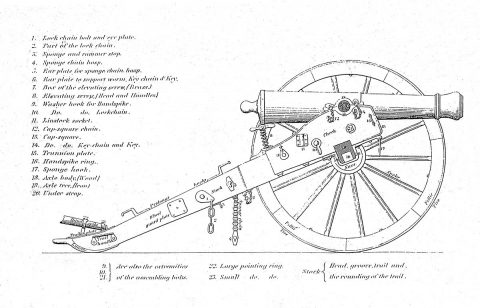
In the three-year period from 2010 through 2012, using the project as “fill-in” work, Clarksville Foundry patternmaker James Lumpkin built a total of 13 patterns to produce all the necessary components of the carriage.
The Sesquicentennial cannon, also displayed for a time at the Montgomery County Courthouse, made such an impression that when Clarksville Rotary Club’s past presidents came together to plan activities for their 100th Anniversary this month, they approached Foust about casting another replica for permanent display downtown.
Foust – both engineer and history buff – happily obliged and took the replication process to the extreme by casting, fabricating and assembling every part required for the complete barrel and carriage. The replica cannon will be unveiled in a public ceremony hosted by the Clarksville Rotary Club, Friday, May 12th at 10:30am on the Montgomery County Courthouse grounds. Porter’s Battery, a local Civil War reenactment group, will fire the cannon after the unveiling.
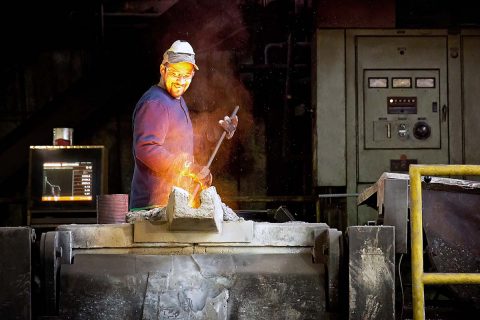
“The cannon project was appealing for a number of reasons,” said Foust. “It is a connection to our city’s rich history, and it allows us to showcase our company’s capabilities in a form that has generated tremendous community and regional interest.”
The casting of the carriage components began in September 2016. The barrel was the last component cast, poured on April 13th. Assembly has progressed rapidly since.
The 6-Pounder Field Gun is named after the weight of the cannon balls it fires. The cannon shot a 6-pound ball that could travel about 1,500 yards. The cannon barrels were originally made from either cast iron or bronze, with bronze being more common with a weight of 880 pounds.
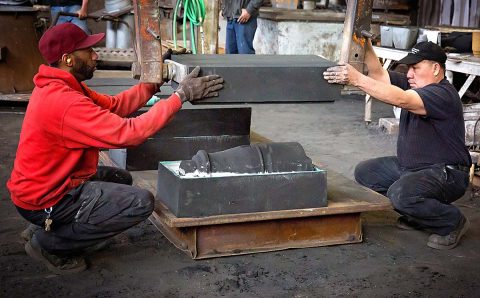
The cannon barrel measures 5 feet in length with a bore diameter of 3-5/8 inches. The wood carriage weighed 900 pounds and required six horses to pull the assembly. Originally manufactured for use in the Mexican-American War (1846-1848), the 6-Pounder was one of the more common artillery pieces of the Civil War, produced and used by both the North and the South.
The Sesquicentennial cannon’s carriage was provided on permanent loan from Shiloh National Military Park. For this latest replica, Foust returned to the original Civil War-era armament drawings to draft the plans to manufacture the carriage in-house.
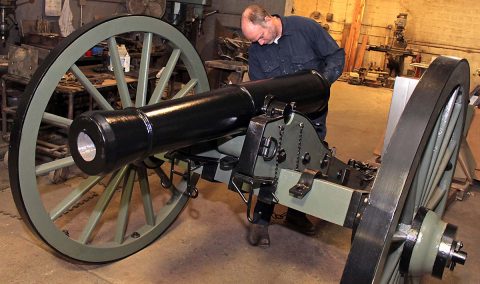
“The cannon barrel and carriage was 100 percent made here,” Foust said. “I’m pretty impressed by how it turned out.”
The 850-pound replica cannon’s barrel and carriage are cast using ductile iron. During the Civil War era, cannons would be made from gray cast iron, as ductile iron was not invented until 1943. The carriage would have been constructed primarily from wood.
Typically, Clarksville Foundry produces castings for a variety of industries, such as components for air compressors and electrical switchgear. A public art display like the cannon allows the foundry to showcase its capabilities in a more visible manner.
“We don’t know how many of the castings we produce will be used by our customers. We ship them out and move on to the next project,” Foust said. “The cannon is going to be sitting on the courthouse grounds for years to come. Local citizens and visitors will see it every day. It’s a big deal.”
Clarksville Rotary Club has sponsored many community projects throughout its 100 years, including the recent addition of a splash pad and playground at Heritage Park.
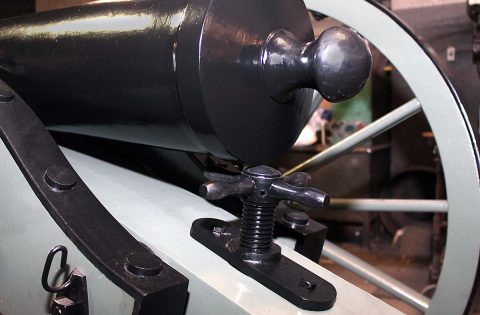
“The Rotary Club has contributed to our community in many ways,” said Carter Briggs, Clarksville Rotary member and past president. “Some of our contributions have been projects that are both visible and everlasting, like Rotary Park, International Avenue of Flags, the Where Imagination Flows playground in what is known today as Liberty Park and now the Rotary Cannon at the Courthouse. These projects benefit our fellow citizens and our community by providing recreational opportunities and showcasing our rich heritage.”
Clarksville Foundry also produced a smaller 50-pound, 2-foot-long cannon replica, which is being donated as a Silent Auction item for the Clarksville Rotary Club 100th Anniversary Gala, May 17th. For more information about Clarksville Rotary Club or its 100th Anniversary Celebration, visit www.clarksvillerotaryclubtn.com.
About Clarksville Foundry
Clarksville Foundry provides turnkey casting services that take a project from concept through interpretation of engineering drawings, to pattern construction, production of molds and ultimately the casting of parts in a variety of iron alloys.
Charles Foust Jr. is the third generation of his family to run and manage Clarksville Foundry. In 1994, Foust was named Tennessee Small Business Person of the Year by the United States Small Business Administration.
For more information about Clarksville Foundry, visit www.clarksvillefoundry.com

